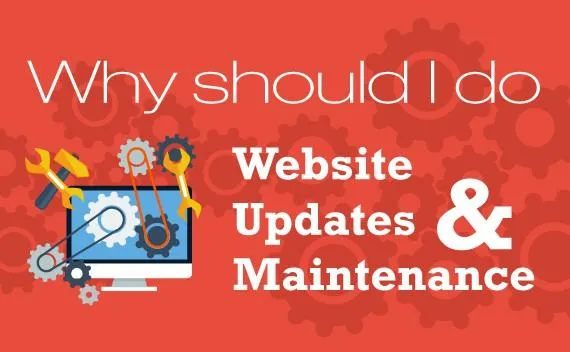TO LEARN IS TO GROW
Learning Center
We do our research and publish our results. Should probably call this the Growing Center.


Why Should I do Website Updates and Maintenance?
Did you know that according to the Website Hacked Trend Report of 2016, out of over 11,000 malware- infected websites analyzed by Sucuri, 75% of those sites were on the WordPress platform while over 50% of those websites were out of date. It’s no surprise that with the over 1 billion websites on the internet today, there is bound to be a fair amount of security risks when it comes to running a business website.
Chances are that your website has been exposed to some form of malware, or what is basically a type of malicious software that is used with the intention of disrupting, and sometimes stealing information, from websites and software. Typically we think of malware in the form of viruses or spam-related scams and many of us are familiar with the basic concept of antivirus software that you can install in your PC to help fight against such malware (e.g., Norton and McAfee).
Compromised website security can compromise your business
Cyber security for your website is no different, in that you need to be vigilant about regular updates and maintenance if you want to have the best odds of defending your business and your information from malware. If your website is vulnerable to predatory software, you run the risk of losing your clients and the trust of people in your community who no longer feel they can use your site. One small infection from a malware virus can even get blacklisted from Google, costing you untold amount of business.
Content Management Platforms (CMS) are particularly vulnerable to attack
Since CMS platforms like WordPress are such user-friendly sites, they are partially susceptible to backdoor hacks so it’s even more imperative for you to regularly update and maintain your website if you are operating on a CMS. Many platforms will offer an automatic update that helps to reduce the assault of hackers and spam-bots trying to compromise their client’s websites, though new types of malware of created every minute.
Web Application Firewalls (WAF) are another tool used by certain platforms that work by evaluating and filtering traffic to your website based on its legitimacy, and ultimately help protect the server from compromises in cyber security.
Update your website to keep your customers interested
When reading an article or blog post online, most of us would most likely prefer to read the article written in 2017, rather than the one on the same topic from 2013. The same goes for your website; if you don’t have up to date information, leave old articles up, don’t engage regularly on your blog, or remove the spam from your comments section, your readers will get the sense that you aren’t dedicated or don’t pay attention to detail, and will find a website that does fit their needs. It’s hard to overstate just how important it is to regularly update your website, both for the sake of your customers, and for the security of your business.
Why do it all alone? Hire a website manager to maintain and update your site for you!
We know you have more important things to worry about than running weekly updates and routine maintenance checks on your entire website, so why not leave it to a team of web managing experts to keep your website running smoothly for you? Take a look at some of the cyber security options we offer, and see how our website maintenance solutions can help improve your online marketing strategy!
Written by Cassandra Sohn

Why Should I do Website Updates and Maintenance?
Did you know that according to the Website Hacked Trend Report of 2016, out of over 11,000 malware- infected websites analyzed by Sucuri, 75% of those sites were on the WordPress platform while over 50% of those websites were out of date. It’s no surprise that with the over 1 billion websites on the internet today, there is bound to be a fair amount of security risks when it comes to running a business website.
Chances are that your website has been exposed to some form of malware, or what is basically a type of malicious software that is used with the intention of disrupting, and sometimes stealing information, from websites and software. Typically we think of malware in the form of viruses or spam-related scams and many of us are familiar with the basic concept of antivirus software that you can install in your PC to help fight against such malware (e.g., Norton and McAfee).
Compromised website security can compromise your business
Cyber security for your website is no different, in that you need to be vigilant about regular updates and maintenance if you want to have the best odds of defending your business and your information from malware. If your website is vulnerable to predatory software, you run the risk of losing your clients and the trust of people in your community who no longer feel they can use your site. One small infection from a malware virus can even get blacklisted from Google, costing you untold amount of business.
Content Management Platforms (CMS) are particularly vulnerable to attack
Since CMS platforms like WordPress are such user-friendly sites, they are partially susceptible to backdoor hacks so it’s even more imperative for you to regularly update and maintain your website if you are operating on a CMS. Many platforms will offer an automatic update that helps to reduce the assault of hackers and spam-bots trying to compromise their client’s websites, though new types of malware of created every minute.
Web Application Firewalls (WAF) are another tool used by certain platforms that work by evaluating and filtering traffic to your website based on its legitimacy, and ultimately help protect the server from compromises in cyber security.
Update your website to keep your customers interested
When reading an article or blog post online, most of us would most likely prefer to read the article written in 2017, rather than the one on the same topic from 2013. The same goes for your website; if you don’t have up to date information, leave old articles up, don’t engage regularly on your blog, or remove the spam from your comments section, your readers will get the sense that you aren’t dedicated or don’t pay attention to detail, and will find a website that does fit their needs. It’s hard to overstate just how important it is to regularly update your website, both for the sake of your customers, and for the security of your business.
Why do it all alone? Hire a website manager to maintain and update your site for you!
We know you have more important things to worry about than running weekly updates and routine maintenance checks on your entire website, so why not leave it to a team of web managing experts to keep your website running smoothly for you? Take a look at some of the cyber security options we offer, and see how our website maintenance solutions can help improve your online marketing strategy!
Written by Cassandra Sohn
Growing Businesses Since 2008
We have helped hundreds of businesses just like yours. Working for or along-side of business owner, managers, staff, or even board of directors, LOJO is ready to be an asset to your business.
Our team has been curated through the years for individual skills, personalities, and capabilities. Our clients put their trust in us to help them grow. We are here to do just that.



Growing Businesses Since 2008
We have helped hundreds of businesses just like yours. Working for or along-side of business owner, managers, staff, or even board of directors, LOJO is ready to be an asset to your business.
Our team has been curated through the years for individual skills, personalities, and capabilities. Our clients put their trust in us to help them grow. We are here to do just that.




Matthew Rogers, President
iProspect Check
After spending several months reviewing multiple proposals from several different companies we engaged LOJO to develop a new website that represents our company effectively. We worked initially with Stephen Platte who helped create the scope of the project. Stephen was knowledgeable and always followed up with me on time and as promised.
He "closed the deal" for LOJO with his professionalism, service orientation and easy going approach. Once we signed the contract we were introduced to Jay Kelly who would be the creative lead for LOJO. This was the most challenging part of the project for my company, as there was no shortage of ideas from our side. Jay managed the project flawlessly, and once we had all agreed to the design, Jay introduced us to Eric.
Eric Lay is one of the founders of LOJO. Eric took the design we had developed and brought it to life. We delivered content as quickly as he requested it. Eric kept the project on task and we responded by exceeding every deadline for content. In turn, once provided, literally not a day went by that Eric didn't add the content and take the next step. In just a few weeks we launched our new website. Eric is a pleasure to work with.
His positive attitude and consultative approach really enhanced the experience and made a big difference for us in the outcome of our project. We would welcome you to visit our website to take a look at the quality work of LOJO. We are very pleased with LOJO and look forward to working with them in the future as we pursue an aggressive SEO strategy."
After spending several months reviewing multiple proposals from several different companies we engaged LOJO to develop a new website that represents our company effectively. We worked initially with Stephen Platte who helped create the scope of the project. Stephen was knowledgeable and always followed up with me on time and as promised.
He "closed the deal" for LOJO with his professionalism, service orientation and easy going approach. Once we signed the contract we were introduced to Jay Kelly who would be the creative lead for LOJO. This was the most challenging part of the project for my company, as there was no shortage of ideas from our side. Jay managed the project flawlessly, and once we had all agreed to the design, Jay introduced us to Eric.
Eric Lay is one of the founders of LOJO. Eric took the design we had developed and brought it to life. We delivered content as quickly as he requested it. Eric kept the project on task and we responded by exceeding every deadline for content. In turn, once provided, literally not a day went by that Eric didn't add the content and take the next step. In just a few weeks we launched our new website. Eric is a pleasure to work with.
His positive attitude and consultative approach really enhanced the experience and made a big difference for us in the outcome of our project. We would welcome you to visit our website to take a look at the quality work of LOJO. We are very pleased with LOJO and look forward to working with them in the future as we pursue an aggressive SEO strategy."

Matthew Rogers, President
iProspect Check
The team at LOJO were wonderful to work with. They are well organized and very patient as we worked through our marketing strategy and developed a well thought out and clear action plan at a reasonable price. We will definitely be back for our future campaign needs."

Jon Crosby, Founder
Dazil

